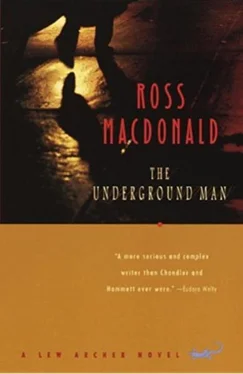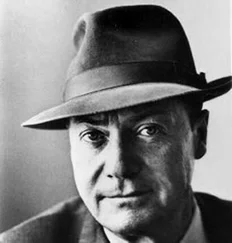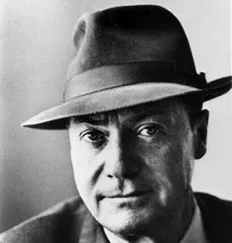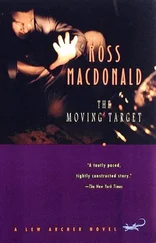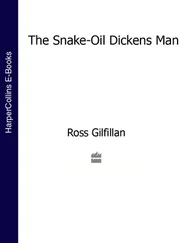“Forget about her, too. What you need is a guard.”
“I have you.”
“But I won’t be staying. I wish I could persuade you to leave town.”
“I can’t. Grandma Nell is depending on me.”
“So is Ronny. You may have to make a choice.”
“You seriously think he’s still in danger?”
“I have to think so. He saw the man who murdered your husband.”
“Could he describe him?”
“Not really. He had a beard and a wig that were probably false. But I got the impression that it might just possibly be someone that Ronny knows. I wouldn’t press him on the subject. But if he does any spontaneous talking keep a record, will you? Every word if you can.”
“I will.”
She looked across the room at her son as if his round skull contained the secret meaning of her life. He said with the light of discovery on his face:
“There’s been a fire around here. I can see it and I can smell it. Who started the fire?”
“That’s what we’re trying to find out.” I turned to his mother. “I want you to think about getting out of here before dark.”
“Nothing happened last night.”
“Your son wasn’t here last night. You’ll both be safer in the Wallers’ apartment in Los Angeles. Just say the word, and I’ll drive you–”
She cut me short: “I’ll think about it.” Then she softened her answer. “I’m really very grateful for the offer. Only it’s hard for me to think right now. I only know I can’t go back to Northridge.”
I heard the rising mutter of a car approaching the house and went outside. It was Kelsey, driving a Forest Service station wagon. He climbed out and gave me a semiofficial handshake. His suit was rumpled, and his eyes had a slight glare in them.
“I got your message, Archer. What’s on your mind?”
“There’s quite a lot to tell you. First, I’d like to know what you got from your witness yesterday. The coed who saw the bearded man driving the car.”
“That was all she saw,” Kelsey said with some disappointment. “All she could give me was a general description.”
“What about the car?”
“It was an older car. She couldn’t tell the make. She thought it had a California license, but she wasn’t absolutely sure. I’m going to take another crack at her today. Shipstad of the LAPD asked me to.”
“You got in touch with Arnie?”
“I called him this morning. He’s pretty well discarded the idea that the wig and the beard belonged to Albert Sweetner. They didn’t fit him at all well. Shipstad is trying to trace them through wig stores and cosmetic companies. But it’s a big job and it may take a while. It would help if we could get a better description of the man my witness saw.”
“He was fairly small,” I said, “if I can believe my witness. He was wearing black slacks, some kind of black shirt or sweater, and dark glasses. And there’s no doubt he murdered Stanley Broadhurst.” I filled him in on what I had learned in the last twenty-four hours. “Can we get hold of a bulldozer and a man to operate it?”
“I believe we left one on the campus, in case the fire came back. I can run it myself if it’s still there.”
“Do you think the fire will come back?”
“Not unless the wind plays us false. We set a successful backfire above Buckhorn Meadow this morning. We should have it under control in another twenty-four hours – maybe sooner if we get the rain that’s predicted.” He glanced at the moving sky. “I’m hoping for just enough rain to discourage Rattlesnake but not enough to bring the mountain down on us.”
Kelsey asked me to ride with him in the station wagon. In order to keep my freedom of movement I said that I would follow along in my car.
We drove out through the scorched mouth of the canyon and up into the foothills. The campus playing field, which had been swarming with men and machines the day before was almost deserted. A couple of maintenance men were picking up bottles and scraps of paper and replacing turf.
A tractor equipped with an earth-moving blade was standing in the lot behind the bleachers. While Kelsey was getting it started, I climbed to the top of the stands and looked around.
Whitecaps stippled the surface of the ocean. Above the coastline to the southeast, smoke hung like early twilight in the sky. At the other extreme of vision, storm clouds were moving down from the northwest, trailing black rain along the coastal mountains. It looked like a day of change.
Kelsey rode the tractor down the hillside trail. I followed along in his dust, carrying a spade I had borrowed from the maintenance men.
For twenty or thirty minutes I leaned on a sycamore trunk and watched the tractor push dirt in a slow back-and-forth rhythm. When it got about as deep into the earth as a man is tall, its leading edge jarred against metal and Kelsey nearly pitched head first from his seat.
He backed out of the gradual hole he had made and let me climb down into it. In a few minutes I had spaded clear enough of the metallic obstruction to see that it was a dark red car top blotched with the lighter red of rust and shaped like a Porsche roof.
I cleared the left front window and smashed it with the spade. The odor of corruption came out, dry and thin and shocking. In the hollow of the car’s body something wrapped in a rotting blanket lay on the front seat.
I stretched head down in the dirt and peered in at the dead man. The flesh was always the first to go, and then the hair, and then the bones, and finally the teeth. Leo Broadhurst was all bones and teeth.
I left Kelsey widening and deepening the hole around the buried car and phoned the sheriff-coroner’s office from the college. Then I drove down the hill and paid another visit to Fritz Snow’s house.
Somewhat to my surprise, Fritz answered the door himself. He was dressed in an old brown cardigan and slacks, with worn sneakers on his feet. His shoulders were bowed and his eyes bleared as if the weekend had lasted a generation and aged him by that much.
He blocked my entrance with his soft reluctant body. “I’m not supposed to let anybody in.”
“You wanted to talk to me yesterday.”
“Did I?” He seemed to be trying to remember. “Mother will slay me if I do.”
“I doubt that, Fritz. The secret’s out anyway. We just dug up Leo Broadhurst.”
His heavy gaze came up to my face. He seemed to be trying to read his future in my eyes. I could read it in his: a future of fear and confusion and trouble, resembling his past.
“May I come in for a minute?”
“I guess so.”
He let me in and closed the door behind me. He was breathing audibly, as if the action had used up most of his strength.
“You told me yesterday that you buried Mr. Broadhurst. I thought you meant Stanley. But you meant his father Leo, didn’t you?”
“Yessir.” He looked around the sparse room as if his mother might have bugged it. “I did a terrible thing. Now I’ve got to suffer for it.”
“Did you kill Leo Broadhurst?”
“No sir. All I did, I buried him with my ’dozer when he was already dead.”
“Who put you up to it?”
“Albert Sweetner did.”
He nodded in confirmation of his own statement, then looked at me to see if I believed it. I neither believed nor disbelieved it.
“Albert Sweetner made me do it,” he said.
“How could Albert make you do it?”
“I was ascared of him.”
“You must have had more of a reason than that.”
Fritz shook his head. “I didn’t want to bury him. I got so nervous I couldn’t run the machine. Albert tried to take it back to the compound. He ran it in the ditch off Rattlesnake Road, and they caught him with it and sent him back to prison.”
Читать дальше
